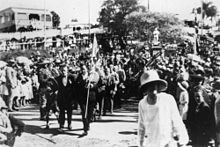As we approach Anzac Day in the centenary year of the beginning of the First World War, we are sure to see outpourings of reminiscence and myth about the ‘Great’ War. Francesca Beddie brings to the attention of fellow historians some of the efforts being made to encourage balance and honesty in the history being presented.
First is the recently established Canberra-based association called Honest History. It aims to get across these important messages: ‘there is much more to Australian history than the Anzac tradition’ and ‘much more to our war history than nostalgia and tales of heroism’. The association will also challenge the misuse of history in the service of political or other agendas.
Honest History’s latest newsletter lists some of the plethora of events about to take place. One of those will be at the Lowy Institute in Sydney on 2 April. Historian Peter Edwards and former soldier James Brown, will explore the conflicts in Vietnam and Afghanistan to assess what lessons Australia has learnt from war – and those we have yet to learn.
Another organisation set up to inform policy and to uncover the myths of the past so often mobilised in contemporary political rhetoric is the UK History and Policy Network. In January it published an opinion piece by Dr Karine Varley commenting on the political use of war commemoration and the role of historians in war remembrance. She explains that the historian’s role is to analyse why and how a war was conducted. Varley argues this does not necessarily conflict with commemorating the sacrifices of those who fought and died, although it may draw some uncomfortable conclusions about war.
One more initiative relevant to this discussion about the uses of history is the UK government’s History of Government blog, now curated by the National Archives but also a result of a collaboration between the History and Policy Network and 10 Downing Street. Pertinent to this discussion about war is Professor Richard Toye’s post placing on record the facts about Winston Churchill’s most famous speech: We shall fight on the beaches.
2014 should be a good year for history but do keep your eye out for its misuse and hold perpetrators to account!
Image: Anzac Day at Manly, Queensland, 1922

Where would we be without myth and the swirl of fact mixed with fiction? Honest History – not a particularly useful descriptor because by the time various interest groups have had their say, we’re back to more sloganeering and propaganda. But, from what little I’ve read I agree completely with what HH is trying to do. My view is that Australia has buried itself deeply in mawkish sentiment and very silly WW1-related stories, eg Simpson and his donkey.
As a professional historian I find this whole thing really problematic. I am aware of the issues but I don’t like being told how I should feel about WW1, whether it is by politicians or historians. I have a great uncle who was killed at Gallipoli in the first charge of the Battle of the Nek (on which the final scene of the film Gallipoli is based). I am proud of him, his courage and actions! My wife has four great uncle who served in WW1, 2 of whom were killed, one whose life was wrecked by PTSD and one who lived to old age. Ultimately Australians will think what they want to think without intellectuals and politicians forming a thought police. My wife and I will commemorate WW1 with a mixture of pride and sadness, and understanding for the great uncle and his loved ones whose lives unravelled through his PTSD (shellshock).
a great book about a non-hero was published a few years ago and tells the tale of Tom Skeyhill. I think more of these real stories of the survival of the physical and mentally injured need to be told. see http://www.anchorbooksaustralia.com.au
I think the centenary is a great opportunity to engage audiences in the work of historians abd the outputs of these practice. It will be one of the few times when a broad spectrum of people are thinking about the past. We have a real opportunity to whet their appetites and lead people to where they can learn more.
Honest History’s motto is not only Anzac but also [lots of other strands of Australian history]. Of course, Anzac and war generally has been an important shaper of our country but so have many other factors. We sell ourselves short if in the next four years we let ourselves sink in a flood of Anzackery (overblown Anzac mythology). The centenary should be an occasion to focus more broadly on the many strands of our history. Honest History is history robustly based on evidence; balanced history is a contest between evidence-based interpretations.
A very interesting time for historians but also for many Australians investigating family history. Do a straw poll amongst your friends as I have and I think you’ll find most have uncles/fathers/grandfathers/great uncles etc who refused to collect their medals and declined to march on Anzac Day because they were feed up with the BS. On the other hand an elderly gentleman I know is busy writing his father’s story. I hope it’s published soon as it is the story of a one-legged Gallipoli veteran who became an anti-conscriptionist, was arrested and remained an anti-war campaigner for the rest of his life. That’s a story I’m looking forward to reading!
Seems like we’re all on the same page. Maybe time for another drinks night at the pub and publicise a talkfest – within and outside the PHA. I’m all for public engagement…..